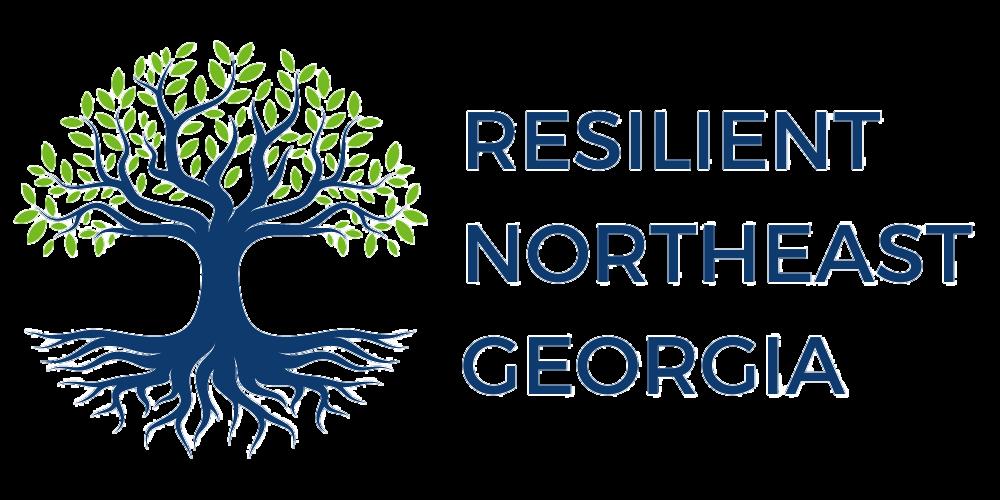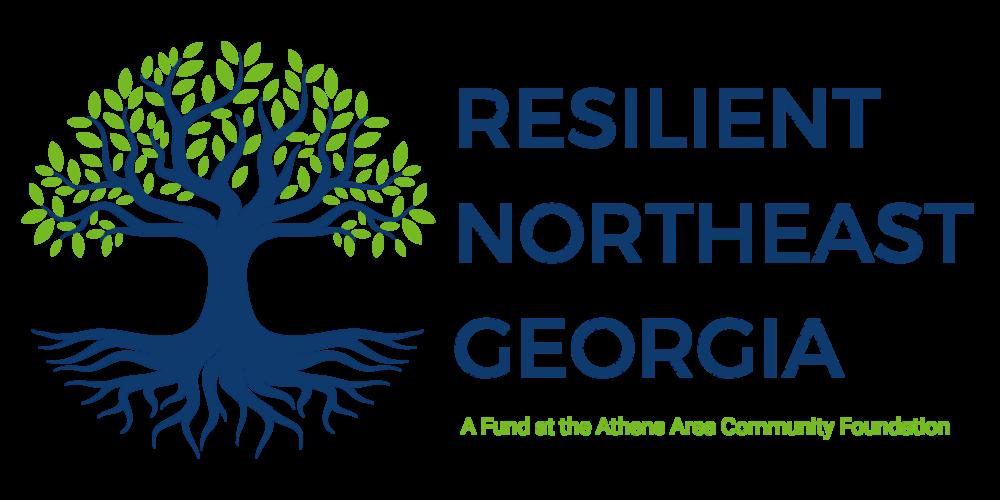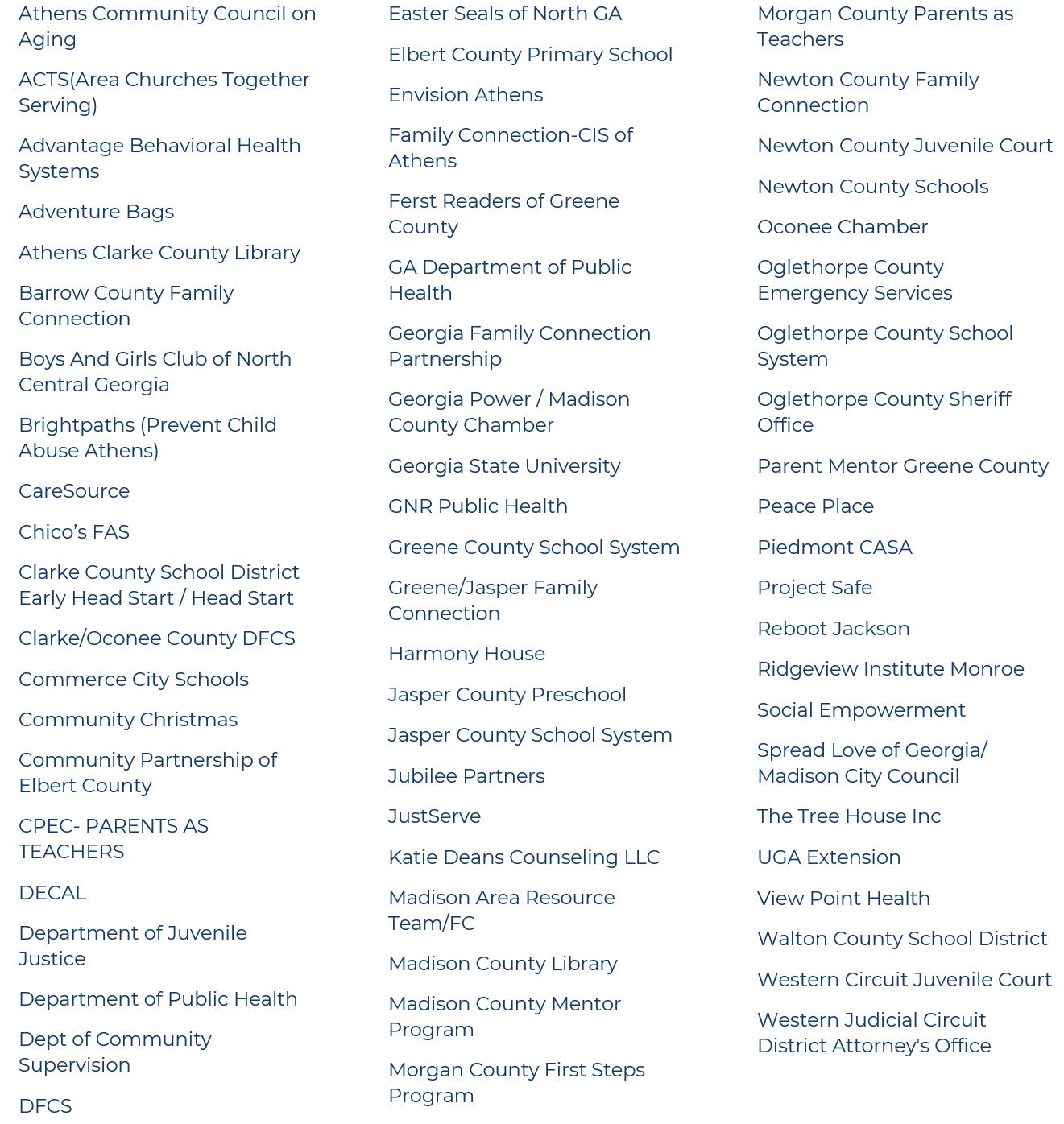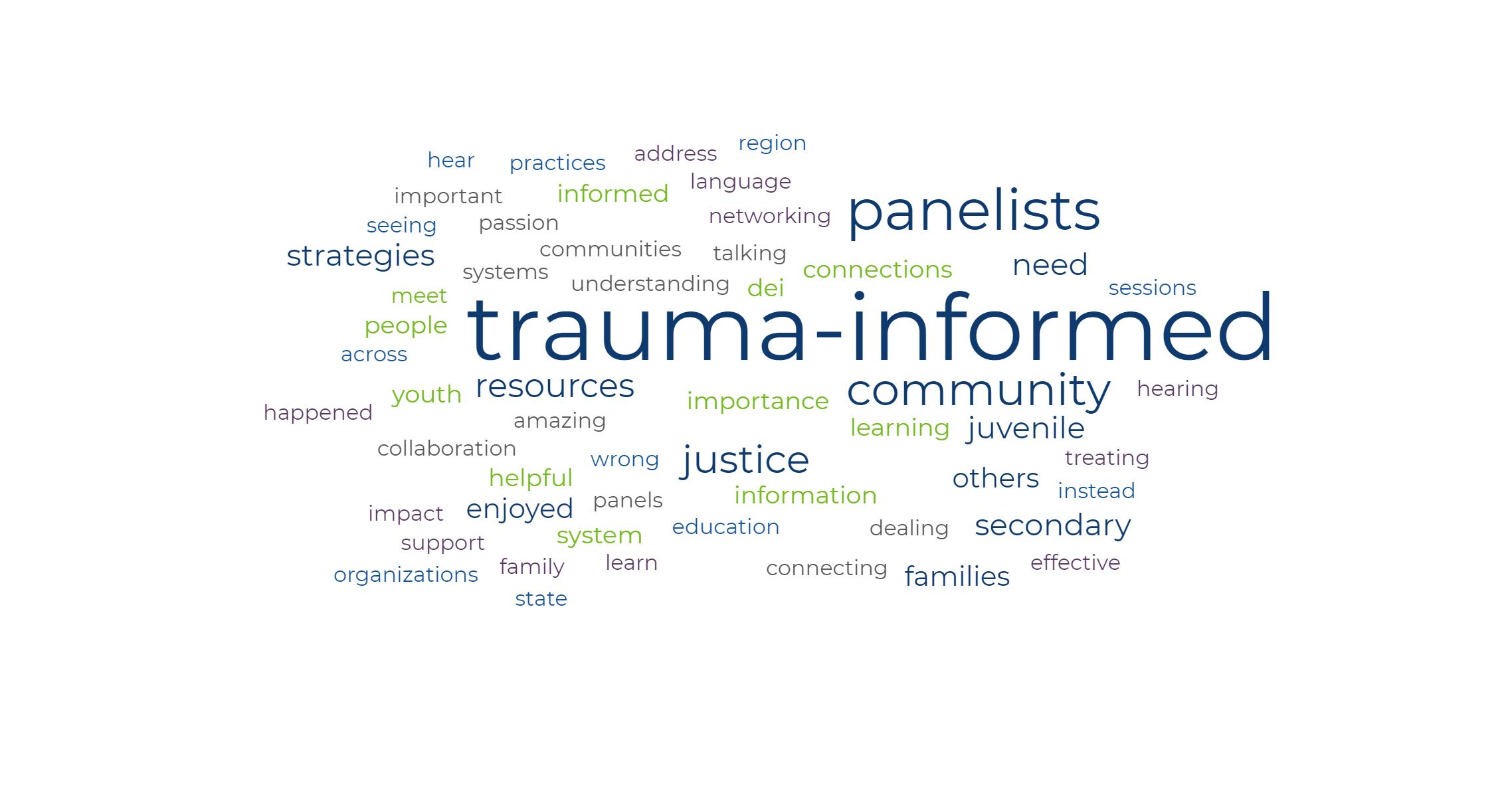

REPORT BACKGROUND
About the Grant and Partners
Resilient Northeast Georgia is a special project fund at the Athens Area Community FoundationandismadepossiblethroughthegeneroussupportofResilientGeorgia.As acoalition,ResilientNortheastGeorgiaworkstopreventandmitigateAdverseChildhood Experiences across through 1) coordinated crosssector initiatives, 2) traumainformed workforce development, 3) creation of a common language around trauma, adversity, and resiliency, 4) promotion of policy, program, system, and environment change throughthelensofjustice,equity,diversity,andinclusion,and5)creationofaregional collaborativemodel.


AdministrationofthefundismanagedoutoftheAthensAreaCommunityFoundation, apublicgrantmakingorganizationworkingtoshapeeffectiveresponsestocommunity needsandservingasatrustedleader,partner,andguideforlocaldonors,nonprofits,and communityinstitutionsacrosstheregion.
AthensAreaCommunityFoundation'sResilientNortheastGeorgiafundworksindirect partnership with Georgia Family Connection Partnership's region 5, brokering relationshipswiththecoordinatorsofeachofthetwelvecounties(Barrow,Clarke,Elbert, Greene, Jackson, Jasper, Madison, Morgan, Newton, Oconee, Oglethorpe, and Walton counties)toeffecttraumainformedinitiatives,trainings,andcollaborativeeventsacross the entirety of the northeast Georgia region. The Athens Wellbeing Project provides evaluation services through the collection and utilization of primary and secondary regionaldatasources.
EXECUTIVE SUMMARY
Stronger Together Survey Results
OnJune28th,2022,theAthensAreaCommunityFoundation'sResilientNortheastGeorgia grant project, in partnership with Georgia Family Connection Partnership's region five, hosted Stronger Together: Building a TraumaInformed Northeast Georgia, a summit that gatheredtogether151individualsfromacrossalltwelvecountiesoftheregionofservicefora dayoftraumainformedlearningandnetworking.Fromthisevent,pre andpost summit surveyswereusedtomeasurechangesinknowledgeandattitudes,usefulregionalresources, and ways that the Resilient Northeast Georgia Coalition can lead and support trauma informedefforts.
Theresultsofbothsurveys,compiledinthisreport,serveasaguideforfutureregionalaction, leveragingtheinsightsandrequestsofthoseworkingonthegroundaroundtheregionto inform the direction of the coalition throughout the remainder of this grant cycle and beyond. As we continue working to create a traumainformed and resilient northeast Georgia,thefindingsofthisreportwillhelpdetermineournextstepsasaregionandatthe county level, working in tandem with existing strategic plans and qualitative data sets to provideasnapshotoftheregionanditspotentialforgrowth.
Summit Attendance Summit attendees represented all 12 counties from the region, althoughwithmarkedinequityinthenumberofparticipantsthatattendedpercounty.The average number of attendee per county was 7, with outliers ranging from 2 to 19 Sector representation was more uniform, with most attendees representing public and social serviceentities,youthservingorganizations,andthecommunityatlarge.
ChangesinKnowledge
Summitattendeesreportedhigherconfidenceintheirknowledgeof the concept of trauma and resiliency as a result of attending the summit, marking a respective27.4%and34.0%increaseintheirperceivedfeelingsofunderstandingfromthe beginningtotheendofthesummit.
Summitattendeesweresurveyedabouttheirperceptionsofregional connectivity,havingenhancedstrategiesfortraumapreventionandmitigation,andhaving tangiblenextstepsforcarryingouttrauma-informedworkintheircommunities.Feelingsof regional connectivity increased by 319.4% by the end of the summit, with corresponding gainsinhavingenhancedstrategies(+657.7%)andtangiblenextsteps(+796.9%)reported. Overall, attendees reported increased confidence in their own capacity to effect and lead changeintrauma-informedcommunitywork,notingrequestedresourcesandsupportfrom Resilient Northeast Georgia and regional partners. Attendees were also asked to rank the coalition's aims in terms of importance and relevance to their communities. From these rankings, building a common language and awareness around trauma, adversity, and resiliencyemergedasthemostpertinentaim,althoughallaimswererankedatthehighest importancebyattendeestowithinthreepercentagepointsofeachother.Thesecondaim, which deals with traumainformed economic development activities, saw the largest percent change from the pre to post surveys with a 72.71% increase by the end of the summit.
ChangesinAttitudes
EXECUTIVE SUMMARY
Stronger Together Survey Results
SessionsandContentToascertaintherelevance,engagementlevels,andresonanceofthe summit'stopics,participantsprovidedfeedbackontheevent,speakers,breakoutsessions, and topics covered. At the end of the summit, 77.2% indicated that the information presented was very relevant to their current job, with 80.2% finding the content relevant overall. 74.3% of attendees found the sessions and speakers to be very engaging and interactive. Looking ahead to the possibility of planning another summit, 91.1% of participantsratedsessionlengthas"justright",withtheremaining8.9%indicatingadesire for longer breakout sessions in the future. Overall, 98% of surveyed participants indicated willingnesstoattendasimilarregionalsummitinthefuture.
Connectivity and Next Steps Leveraging qualitative feedback, this section of the report provides possible future directions for the region from the perspective of the summit attendees. Attendees intend to building and maintain connections made at the summit, engagewithtrainingsandcommunityevents,findandutilizeimplementationtoolsintheir owncommunities,andleveragetrauma-informedstrategiesintheirowncommunities.To supporttheseefforts,respondentsrequestedaccesstoadditionaltrainings,connections,and resourcesfromResilientNortheastGeorgia.
Afterconductingananalysisoftrendsinparticipantresponsesfromthepre-andpostsurveys,thefollowingthemesemergedrelatedtodesirednextstepsandresources;
Buildingsocialcapitalacrosscountylines.Summitattendeesexpressedadesireto engage in conversations and form deeper relationships with people from other sectorsofthecommunityaswellasfromdifferentcountiesacrosstheregion.
Connectiontoresourcestoenhancecounty-levelapproaches.Summitparticipants expressedadesiretotakeamoreactiveroleinlocaltraumainformedwork.Finding ways to go beyond trauma awareness by learning to leverage data from local and regional sources, communicate with and build coalitions more effectively, and engagestakeholdersininnovativeandmeaningfulwaysrankedhighly.
Strategies for implementing training, interventions, and approaches to trauma. Surveyrespondentsareseekingpeertopeerguidanceinimplementation,bothfrom Resilient Northeast Georgia and from other regional partners. Trends in the data suggest that respondents are looking for practical applications for the information andresourcesthey'reamassingrelatedtotraumainformedcommunityefforts.
Building skills related to policy and advocacy activities. Communities and organizationsareactivelyseekingstrategiesandskillsforinfluencinglegislatorsand policymakersthroughadvocacy,bothlocallyandregionally.
ATTENDANCE Organizations Represented

CHANGE IN KNOWLEDGE
Resiliency
CHANGE IN ATTITUDES Community Approach to Trauma
CHANGE IN ATTITUDES
Tangible Next Steps
Pre-Summit
CHANGE IN ATTITUDES
Importance of Coalition Aims
CHANGE IN ATTITUDES
Importance of Coalition Aims
Post-Summit Please indicate how important the following approach to trauma prevention is to your community: Advancing the workforce through recruitment, development, and traumainformed education.
CHANGE IN ATTITUDES
Importance of Coalition Aims
CHANGE IN ATTITUDES
Importance of Coalition Aims
Post-Summit Please indicate how important the following approach to trauma prevention is to your community: Advocating for changes to policies, programs, systems, and environments that incorporate a Justice, Diversity, Equity, and Inclusion (JEDI) lens. 101 Responses
CHANGE IN ATTITUDES
Importance of Coalition Aims
SESSIONS AND CONTENT
Content Relevance
Relevance to Current Role
Relevance of Topics and Speakers
SESSIONS AND CONTENT
What Resonated Most with You?
What topics resonated with summit attendees the most?
At the end of the summit, we asked attendees what topic presented during the summit resonated with them the most. Shown above are some of the most common responses from the survey.
The themes captured in this question reflect many of the answers shown in other parts of this report. The opportunity for learning together, networking, and making new connections across sectors and geopolitical boundaries were among the most meaningful take-aways from the Stronger Together summit. Many participants also remarked on feeling a collective sense of passion and community drawn from the collaborative activities during the summit, reportedly enjoying the chance to connect with people interested in trauma informed community work.

CONNECTIVITY AND NEXT STEPS
Additional Resources Requested
Requested Resources
What can specific resources can Resilient Northeast Georgia connect you to in the future? Were there any topics/resources not discussed today you'd like to connect with?
More trainings and education
Resources that include family/child involvement
Funding
Policy advocacy support
More engagement with UGA
Mental health services
Connection to more community partners, especially those already doing trauma informed work in their communities
Community-wide strategic planning events
Resource guide/directory
School based information and practices to implement
Suicide prevention resources
Examples of what other communities are doing
Implementation tools for agencies
Behavioral intervention strategies
How to disseminate information community-wide and get successful buy-in
How to find resources
How to get more connected
More data about ACEs and impact in Georgia
Learning more about solutions rather than just the problems
How to succeed after experiencing an ACE
How to implement a trauma-informed library
How to get student voices involved in this work
A list of all organizations involved in the work
More hands on Community Resiliency Model trainings practical application
How to connect existing local and regional work
More direct steps from someone who has successfully done this work
CONNECTIVITY AND NEXT STEPS
Planned Next Steps
Next Steps
What next steps could you see yourself/your organization pursuing after attending the Stronger Together summit?
Following up with new contacts
Have a conversation, find next steps, develop a plan
Collaborating to create a common language
Trainings- new and continued Mental Health First Aid
Getting all levels of staff trained
Planning to share information/opportunities with boss/supervisor
Community education Connection and awareness of resources
Training teachers and school staff to identify risk factors and increased knowledge of prevention measures
Implementation of stronger trauma-informed practices in organization
Reaching out to key decision makers
Connecting with community/regional resources
Connecting with justice system panelists for more ideas/trainings/information for parents and organizations
Looking for solutions to prevent avoidable root causes
Sharing information with other Family Connection regions to help model Region 5’s work around trauma
Community resource guide
A local summit
Community summit for service providers
Increased collaboration with Family Connections
Working together with partners to establish a common goal for the work
Reaching out to UGA to educate them about how they can help
Bringing together some of the speakers from other areas to inspire, motivate, and encourage a somewhat complacent mentality that is prevailing in our Collaborative.
Reading and dialoguing about how to become more culturally competent and bold in conversations regarding race and inequity.
